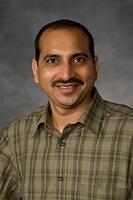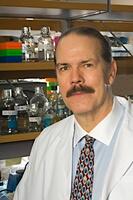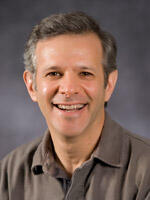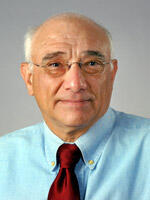May 15, 2013
May Faculty and Staff Features 2013
Share this story
Gajanan K. Dewkar, Ph.D., Research Scientist, Center for Molecular Imaging

Dewkar has received a Scholar-in-Training award from the American Association for Cancer Research (AACR). He was among 17 early career investigators who were chosen for the award based on the merits of their papers submitted for the AACR 2013 annual meeting. Supported by Bristol-Myers Squibb, the $1,500 award covered the costs of attending the annual meeting held in Washington, D.C., in April.
Dewkar, a postdoctoral fellow under the mentorship of Jamal Zweit, Ph.D., professor of radiology and director of the VCU Center for Molecular Imaging, reported on his development of Fluorine-18-carboplatin derivative for cancer molecular imaging and therapy applications. The overall objective of his work is to yield quantitative measurements of drug concentrations in tumors and normal tissues by non-invasive molecular imaging. The goal is that such measurements would guide individual patient dose regimens and also predict response on an individual patient basis. Future plans include the application of this technology in clinical trial studies in collaboration with the VCU Massey Cancer Center.
Paul B. Fisher, Ph.D., Chair of the Department of Human and Molecular Genetics, Director of the Institute of Molecular Medicine and the Thelma Newmeyer Corman Chair in Cancer Research, Massey Cancer Center

Fisher has received the Prostate Cancer Foundation 2012 A. David Mazzone-PFC Challenge Award. Fisher shares this award with Martin G. Pomper, M.D., Ph.D., and George Sgouros, Ph.D., both from Johns Hopkins University Medical Center. The awards are highly competitive two-year prizes that provide a total of $1 million per team in support of large-scale innovative research projects in the area of prostate cancer. As a result of this project, VCU will receive $400,000 over 2 years.
As one of the co-investigators, Fisher will work closely with the other researchers on developing systemically deliverable “theranostic” nanoparticle constructs that will enable molecular-genetic imaging and therapy of prostate cancer. This project may provide a new prostate cancer specific therapy in which a therapeutic transgene is delivered systemically to address both local and metastatic disease.
Using a cancer-selective gene promoter isolated in the Fisher laboratory, progression elevated gene-3 promoter (PEG-Prom) avidin will be placed on the surface of prostate cancer cell. The avidin will serve in a modified two-step “pre-targeting” process, whereby once expressed on the cell surface a biotinylated radiotherapeutic can be used to eliminate the avidin-decorated cells. This novel strategy holds high potential to develop a systemic therapy for prostate cancer.
April Kimmel, Ph.D., Assistant Professor, Department of Healthcare Policy and Research

Kimmel presented research on forecasting HIV treatment expansion in Haiti to representatives from the Centers for Disease Control and Prevention and Haiti’s Ministry of Health at the GHESKIO Center in Port-au-Prince, Haiti. The GHESKIO Center was the first institution in the world dedicated to the fight against HIV/AIDS and has provided medical care in Haiti since 1982.
In collaboration with colleagues from Weill Cornell Medical College, New York City, she also co-taught a weeklong course on economic evaluation of public health interventions for the masters of public health program at the Université Quisqueya in Haiti. Kimmel’s research interests include models of care delivery for HIV/AIDS, global health and population ethics. She is studying the geographic variation in HIV treatment and access to care in the United States.
Kurt F. Hauser, Ph.D., Professor of Pharmacology and Toxicology, School of Medicine

Hauser accepted the Wybran Award from the Society on NeuroImmune Pharmacology (SNIP) at its 19th Scientific Conference on April 6 in San Juan, Puerto Rico.
The Wybran Award is the highest honor bestowed by SNIP in recognition of the very best scientific contributions that have resulted in the preservation and expansion of the field of neuroimmune pharmacology.
The award carries the name of Joe Wybran, a renowned scientist whose work integrated the fields of neuroimmunology, drugs of abuse and immunity to infection. He was killed in 1989, and afterward the award was created to memorialize his scientific prestige in the field and serve as a remembrance of his contributions that underpin SNIP.
William Newmann, Ph.D., Associate Professor, L. Douglas Wilder School of Government and Public Affairs, College of Humanities and Sciences

Newmann participated in the Bahrain International Symposium on March 31 and April 1 at the University of Bahrain. The symposium brought together scholars, politicians, diplomats and educators from the Middle East, the United States, Europe and Asia. The event featured panels focused on political, constitutional, economic and judicial issues in Bahrain. Newmann chaired the political panel and presented research on the difficulties of political reform in Bahrain, which is influenced by the U.S., Saudi Arabia and Iran.
The symposium attracted international analysts, political figures and observers.
Newmann’s research interests include U.S. national security policy and decision making, the U.S. presidency and East Asian security.
Robert Holsworth, Virginia Commonwealth University Board of Visitors
Holsworth, former dean of the College of Humanities and Sciences and current VCU Board of Visitors member, received the Virginia Social Science Association Public Service Award on April 6.
The VSSA is a nonprofit organization that brings a variety of academics together. VCU hosted the conference this year, and more than 100 students and faculty presented from a variety of disciplines.
Holsworth came to VCU in 1978 as an assistant professor in the Department of Political Science. During his time at VCU, he held positions as chair of the political science and public administration department, director of the Center for Public Policy and director of the L. Douglas Wilder School of Government and Public Affairs. In 2006, he became Dean of the College of Humanities and Sciences.
Herbert Hirsch, Professor, Political Science, L. Douglas Wilder School of Government and Public Affairs, College of Humanities and Sciences

Hirsch is part of the team of editors for a new journal titled “Genocide Studies International.” The journal will be housed at VCU under the editorship of Hirsch and three others.
“Genocide Studies International” will focus on the study of genocide and its phenomenon. It will help raise awareness and encourage research in the study of genocide and human rights. The International Institute for Genocide and Human Rights Studies will launch the first issue dealing with "The Failure of Prevention" in November.
Hirsch has held lectures on genocide in various parts of the world and is an active member of multiple groups including the International Association of Genocide Scholars. Hirsch’s teachings focus on American government, Vietnam, genocide, the Holocaust and human rights.
Subscribe to VCU News
Subscribe to VCU News at newsletter.vcu.edu and receive a selection of stories, videos, photos, news clips and event listings in your inbox.










